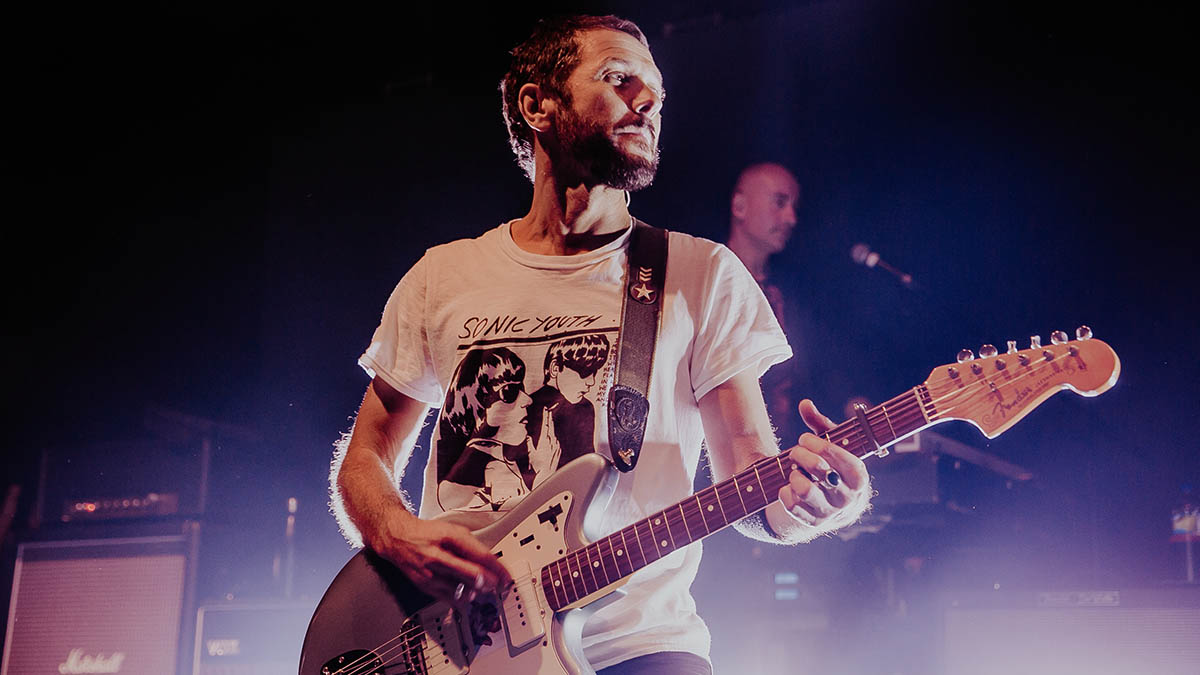Feeder’s Grant Nicholas shares his tips on on songwriting, gear and tone: “You can always find a new way of playing a chord”
Grant Nicholas checks in from his rehearsal space to drop some science, advising players to keep our pedalboards close and our acoustic guitars closer, and to keep on experimenting

When the new Feeder album Torpedo shot to number five on the UK chart in April, it was a sweet moment for a band that has been a fixture on the British rock scene since the late ’90s.
“We were totally blown away with the response to it,” says guitarist/vocalist Grant Nicholas. It was also something of a surprise.
“Honestly, it was going to be a fanbase-only record, a mini release that we weren’t even going to take to radio,” he says. “But then some people heard it and told us we should definitely put it out. And we’ve got loads more material written, so there’s going to be another record hopefully next year – it’s kind of like a double album in two halves.”
Talking from the band’s rehearsal room in London, he explains how he keeps things fresh after all these years – offering advice on writing, soloing, and how pedals give a new twist to what he calls his ‘hovercraft’ sound...
Get yourself a nice acoustic and write what you like to play
“I’ve always tended to write on acoustic guitar, and every track on Torpedo was written on acoustic. I’ve got a couple of old Guild M-20s, I got a Gibson J-200, a Hummingbird, but my main guitar for writing is a nice ’67 J-45 Gibson. It’s got a really thin neck and just the lowest action, like an electric, so you can play a few riffs on it.
“Obviously, then I go into my studio, get the Jazzmaster out, get the fuzzboxes going and take it from there. People think because we’ve had a couple of hit singles we can’t be that heavy, but Feeder’s always had a heavy side, and if you come to a show you’ll see we’re still a pretty rocking band. But it’s still got to be a good song, because that’s what we’re about.
“We enjoyed rocking out on tour for [2019 album] Tallulah, and I remember feeling that the band just came alive when we played Kyoto, so it was on my mind to do something with a bit of that feel. And there was the frustration of not being to play during lockdown – that brought a rock edge to the writing for Torpedo.”
Get The Pick Newsletter
All the latest guitar news, interviews, lessons, reviews, deals and more, direct to your inbox!
Keep your favourite gear close, but try some new effects, too
“I call my sound my ‘hovercraft’ sound, where there’s a lot of top and bottom to it, but I like to mess with new pedals, too. I’ve been using a custom-made ELF fuzz by a Japanese company called RoShi Pedals, along with a Green Big Muff, vintage Tone Benders, my Pete Cornish overdrive, a Memory Man – I’ve been using them since day one – and a RayGun Meatropolis fuzz.
“When I’m recording I like to have loads of pedals all over the studio floor, so I’ve got that freedom to plug things in in different ways and experiment. The main riff for the song Torpedo would’ve been a combination of a Green Big Muff, Tone Bender, an Ibanez Tube Screamer set almost clean and some other stuff.
When you’re working in a small space and can’t crank it out, speaker sims can be really good
“As far as guitars, I used my custom ESP and Custom Shop Strat, but my original ’59 ‘Old Brown’ Jazzmaster is still my go-to electric. It’s got quite low-output pickups which I like for recording.
“When I do the heavy songs I track all the rhythm parts in standard tuning through my Marshall JMP head, which has been on every Feeder track since [1996 EP] Swim. My Vox AC30 and a Fender Hot Rod Deville were recorded through Palmer speaker simulators – when you’re working in a small space and can’t crank it out, speaker sims can be really good.”
It’s all about the song, not the guitar solo
“I’m self-taught – I do everything by ear. When I was younger, I did a lot more lead playing, but I’m not a traditional soloist. I mean, I love great guitar players like Eddie Van Halen, David Gilmour, Randy Rhoads, but it’s not really my style. I’m more of a songwriter, riffy/chordy guy.
“I will occasionally do a traditional solo, like on the track Decompress, but in general my lead tends to be a little bit more off-the-wall, from the Sonic Youth school of rock! I do loads of lead stuff as musical parts, and I think they’re quite tasteful. For me it’s more about chord shapes – you can always find a new way of playing a chord – and tunings.
“The acoustic on Hide and Seek is in open E-shape tuning, and I often tune the guitars down half a step. This is actually the first record I’ve done where I haven’t used a capo – I wanted to keep it really big and dense sounding, so there’s a lot of drop tunings, like drop D.
“Magpie is one of my favourite tracks on the album, because it’s really dense. It’s like this great big dinosaur. I remember walking around the kitchen playing that on my acoustic, and my daughter saying, 'Dad, that’s actually quite cool!'”
Aim to have your own sound, your own musical identity
“The song on Torpedo that sums me up as a player over the last twenty or thirty years of being in the band is When It All Breaks Down. It’s classic Feeder – it’s got the quiet, clean bits, the riffs, the anthemic chorus and the textures, which is what I’m all about.
I like us to sound heavy and powerful, but effortlessly so rather than forced, and aggressive
“But then there’s The Healing, too. The best songs I’ve ever written – and the best songs in rock ’n’ roll – are usually three or four chords. When you can get that to work, it’s just the best. I approached The Healing like that. I wanted it to be a classic rock song – with classic chord changes like, say, Boston’s More Than A Feeling, but undeniably us too.
“I had this massive rock opera thing in my head, and that middle section in there is, to me, very Feeder. What makes us different from a mainstream rock band is we’re not scared to go a bit more alternative. I like us to sound heavy and powerful, but effortlessly so rather than forced, and aggressive. We’ve got better at that as we’ve got older – we’ve still got the power, but we’re not trying to be teenagers screaming our heads off with fake emotion...
- Torpedo is out now via Big Teeth Music.
Grant Moon is the News Editor for Prog magazine and has been a contributor to the magazine since its launch in 2009. A music journalist for over 20 years, Grant writes regularly for titles including Classic Rock and Total Guitar, and his CV also includes stints as a radio producer/presenter and podcast host. His first book, Big Big Train - Between The Lines, is out now through Kingmaker Publishing.
"Upgrading from your entry-level acoustic opens the door to an entirely new world of tonewoods, body shapes, and brands": 6 signs it's time to upgrade from your first acoustic guitar
"I'm past my prime": 5 common excuses for not learning the guitar – and 5 body and mind-boosting reasons you should










